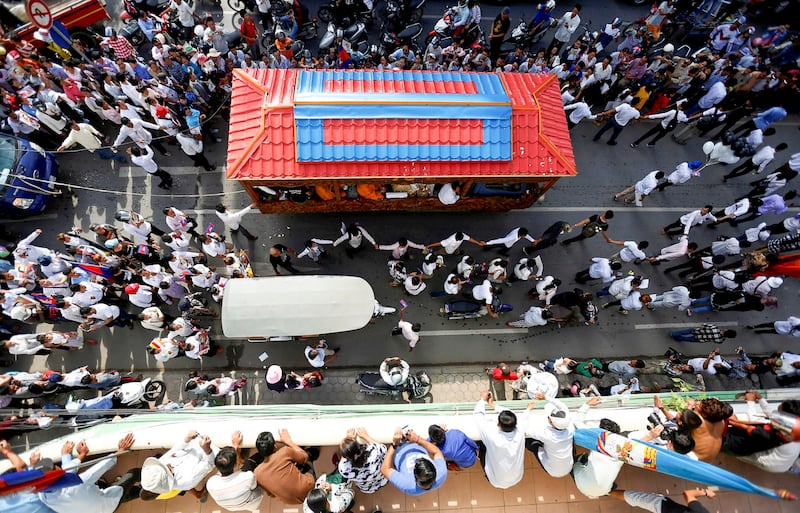Officials at a pagoda in western Cambodia have expelled a Buddhist monk who marked the anniversary of the shooting death of government critic Kem Ley last week, drawing a rebuke from groups who say members of the clergy have the right to publicly express their political opinions.
Saing Rithy, a monk from Damrei Sar Pagoda in Battambang province, joined some 40 activists and supporters on July 10 in honoring prominent political commentator Kem Ley, who was gunned down at a gas station in Phnom Penh eight years ago. The group also called for the release of all political prisoners.
On Monday, Saing Rithy told RFA Khmer that the chief abbot of Damrei Sar, Phon Sokea, admonished him for taking part in the memorial as a member of the Buddhist clergy and demanded that he apologize. When he refused, Phon Sokea expelled him from the pagoda and ordered him to leave the premises within three days.
Saing Rithy said he considers the decision a “suppression of my rights and freedoms,” and a “threat” to him and other monks who take part in social activism.
“The authorities, as well as some Buddhist officials, are pressuring monks to prevent them from participating in social work,” he said. “They won’t let us fulfill our roles [for the community] and I don’t understand why. They continue to threaten and intimidate me, but I haven’t broken any Buddhist rules.”
The monk said he had appealed the decision and is awaiting a response.
RELATED STORIES
[ Cambodian activists remember 2016 shooting of leading government criticOpens in new window ]
[ Labor leader remembered 20 years after his assassinationOpens in new window ]
[ Cambodian refugee monk arrives in Switzerland following brief arrest in ThailandOpens in new window ]
Critic’s killing
Kem Ley was fatally shot in 2016 while having a morning coffee at the gas station, days after publicly criticizing then-Prime Minister Hun Sen and his family for abuse of power and unexplained wealth.
A trained physician who also held a doctorate, he was 45 and left behind four children and a pregnant widow.
Authorities charged a former soldier named Oeuth Ang and sentenced him to life in prison in 2017. Court authorities rejected an appeal and upheld his sentence in 2019, but many in Cambodia do not believe his assertion that he killed Kem Ley over a US$3,000 debt.
The killing was followed by a Supreme Court decision to ban Cambodia’s leading opposition party ahead of national elections. Since then, all independent media outlets have been forced to close and most of the country’s political opposition has been sidelined through the courts or through intimidation.
Rights groups have accused government officials of being unwilling to investigate who was behind Kem Ley’s murder.
Others pressured
Saing Rithy is not the only member of the Buddhist clergy in Battambang to face a backlash for speaking out in support of Kem Ley on the anniversary of his death. Monks from other pagodas in the province reported the presence of “plainclothes police and officials” at last week’s memorial service and said they had also been summoned by senior Buddhist officials over their participation.

It Kham, a monk from Bacha Pagoda in Battambang, said officials from the Ministry of Interior had met with his abbot after the anniversary gathering to “put pressure on me” to refrain from social activism.
But he said that even if it was wrong for members of the Buddhist clergy to take part in political events, they should not face expulsion from their pagodas.
“Expulsion should only take place if a monk commits serious crimes such as murder, robbery or drug trafficking, or immoral acts that hurt the nation and religion,” he said.
Attempts by RFA to reach the Battambang Ministry of Cults and Religion for comment on Saing Rithy’s expulsion and attempts to pressure monks to refrain from social activism went unanswered Monday.
In Kong Chit, an official with the rights group Licadho in neighboring Banteay Meanchey province, told RFA that threatening monks with punishment for speaking out is an infringement of their rights.
“We ask the authorities, officials with the Ministry of Cults and Religion, and the abbots of pagodas to stop expelling and threatening monks, and instead to facilitate their freedom to express their opinions and organize political activities,” he said.
Translated by Sum Sok Ry. Edited by Joshua Lipes.
